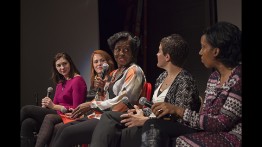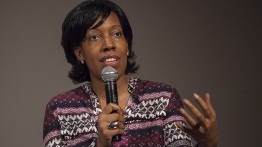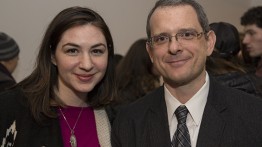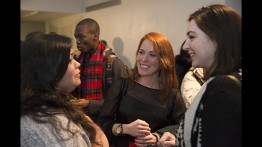Panel Discusses Obstacles to Diversity in STEM Fields
POSTED ON: January 18, 2017
This past Monday, The Cooper Union celebrated Dr. Martin Luther King Jr. Day by co-hosting a panel discussion with esteemed scientists who addressed the paucity of women and minorities in STEM fields and how to turn that trend around.
Centered around a screening of the new film “Hidden Figures,” which tells the story of three female African American mathematicians who worked for NASA during the space race, the event worked to excavate the many unsung heroes of science and technology who have been ignored because of race or gender. The panel was hosted by Avis Yates Rivers, who is CEO and president of Technology Concepts Group International, along with Jenn Halweil, an electrical engineer and producer of #GoBeyond, a docuseries highlighting the groundbreaking science being conducted by women who are breaking glass ceilings in STEM fields.
“How can we expect to create the best technology when we fail to engage the majority of users, particularly women and people of color, in the development process? This is how information bubbles form, and as we’ve seen from history, bubbles eventually burst. Changing the face of technology is no longer something we can afford to ignore,” says Ms. Rivers, who is a White House Champion of Change and author of Necessary Inclusion: Embracing the Changing Faces of Technology.
The other panelists included Dr. Emily Levesque, an astronomer at the University of Washington who studies stars and formerly was a Hubble Telescope postdoctoral fellow; Charlie Oliver, a media expert who recently launched Tech2025 to educate the public on the next wave of disruptive, emerging technologies; and Tamara Robertson, a chemical and biomolecular engineer who hosts Skeptoid Media’s “The Feeding Tube” and a contestant on the Science Channel’s “Mythbusters: The Search."
After a 45-minute discussion, the panelists met students at an informal gathering. Prof. George Delagrammatikas, associate professor of mechanical engineering and STEM Outreach Program director, who brought the event to The Cooper Union, said, “What I think is particularly powerful about 'Hidden Figures' is that it tells a little known story about how women of color have contributed to science and technology. That’s important because role models are critical for bringing more diversity to the field.”








